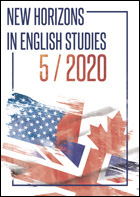The Space of the New Ethnic Neighborhood: Polka Festival as Imagined Community
The Space of the New Ethnic Neighborhood: Polka Festival as Imagined Community
Author(s): Ann Hetzel GunkelSubject(s): Anthropology, Social Sciences, Customs / Folklore
Published by: Wydawnictwo Naukowe Uniwersytetu Marii Curie-Sklodowskiej
Keywords: ethnic space; ethnospace; ethnicity; spatiality; imagined communities; identity; polka; Polonia; Polish-American; festivals; neighborhoods
Summary/Abstract: Following the spatial turn in cultural studies, ethnic space is understood as a cultural category, constructed by discourse and determined by capital, within which people create their own narratives. This essay explores the construction of ethnic space and identity in the phenomenon of the Polish American polka music festival. Framed by the attention to the process of “production of space” (Lefebvre 1991), the essay presumes that new conceptualizations of spatiality assume space is no longer treated as something given, a pre-existing territory, or locale. The case study of the ethnic music festival is an ideal place for examining the invention of place, because it is not located in a fixed space, but in a movable community traveling from festival to festival. The polka festival circuit is attended by a core community of polka boosters, many of whom travel from event to event in vacation motor homes, with attendees setting up "neighborhoods" of motor homes that include front lawns, outdoor kitchens, and "streets." Most bring lawn signs, street signs, flags and other public signs of Polish American identity, recreating—this essay argues—the urban ethnic neighborhood of previous immigrant generations. Polish American ethnic identity for this group of participants is located and recreated in an imagined community that it creates, dismantles, moves and recreates in a mobile spatiality of ethnic belonging. The paper explores the moveable and mutable production of ethnic space arguing that the traditional aspects of nineteenth century village, reimagined in the twentieth century Polonian neighborhood are now recreated anew in twenty-first century polka festival culture: the village, the church, the parochial school, the tavern, the neighborhood economy and the kitchen are creatively refashioned in this mobile ethnic community.Recent scholarship on Polish American polka has argued that contrary to popular stereotype, polka is innovative hybrid alternative music and, furthermore, that preserving polka's history is an important, but often overlooked, part of preserving American multicultural history (Gunkel 2006, 5-8). This project continues that research by providing this spatially-framed study of the phenomenon of the seasonal polka festival. Over a period of five years, I visited polka festivals in North America as a participant observer, documenting the social and cultural landscape of these gatherings of polka people. This essay traces the nature of imagined community in Polish American polka festivals—understood as a diasporic ethnoscape–exploring the construction of ethnic space in the twenty-first century.
Journal: New Horizons in English Studies
- Issue Year: 5/2020
- Issue No: 1
- Page Range: 186-207
- Page Count: 22
- Language: English

